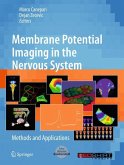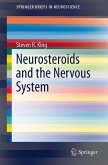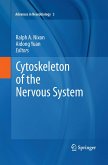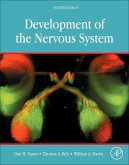Genomics, Proteomics, and the Nervous System
Herausgegeben:Clelland, James D
Genomics, Proteomics, and the Nervous System
Herausgegeben:Clelland, James D
- Broschiertes Buch
- Merkliste
- Auf die Merkliste
- Bewerten Bewerten
- Teilen
- Produkt teilen
- Produkterinnerung
- Produkterinnerung
This newest volume of Advances in Neurobiology discusses the utilization of genomic and proteomic technologies, to address facets of neurobiology including development and epigenetic regulation, functions in learning and memory, and changes associated with neurological and psychiatric disorders.
Andere Kunden interessierten sich auch für
![Genomics, Proteomics, and the Nervous System Genomics, Proteomics, and the Nervous System]() Genomics, Proteomics, and the Nervous System150,99 €
Genomics, Proteomics, and the Nervous System150,99 €![Membrane Potential Imaging in the Nervous System Membrane Potential Imaging in the Nervous System]() Membrane Potential Imaging in the Nervous System75,99 €
Membrane Potential Imaging in the Nervous System75,99 €![Neurosteroids and the Nervous System Neurosteroids and the Nervous System]() Steven R. KingNeurosteroids and the Nervous System39,99 €
Steven R. KingNeurosteroids and the Nervous System39,99 €![Phospholipid Research and the Nervous System Phospholipid Research and the Nervous System]() Phospholipid Research and the Nervous System39,99 €
Phospholipid Research and the Nervous System39,99 €![Neglected Tropical Diseases and Conditions of the Nervous System Neglected Tropical Diseases and Conditions of the Nervous System]() Neglected Tropical Diseases and Conditions of the Nervous System164,99 €
Neglected Tropical Diseases and Conditions of the Nervous System164,99 €![Cytoskeleton of the Nervous System Cytoskeleton of the Nervous System]() Cytoskeleton of the Nervous System224,99 €
Cytoskeleton of the Nervous System224,99 €![Development of the Nervous System Development of the Nervous System]() Dan H. SanesDevelopment of the Nervous System108,99 €
Dan H. SanesDevelopment of the Nervous System108,99 €-
-
-
This newest volume of Advances in Neurobiology discusses the utilization of genomic and proteomic technologies, to address facets of neurobiology including development and epigenetic regulation, functions in learning and memory, and changes associated with neurological and psychiatric disorders.
Produktdetails
- Produktdetails
- Advances in Neurobiology 2
- Verlag: Springer / Springer New York / Springer, Berlin
- Artikelnr. des Verlages: 978-1-4614-2779-7
- 2011
- Seitenzahl: 608
- Erscheinungstermin: 31. Januar 2013
- Englisch
- Abmessung: 235mm x 155mm x 33mm
- Gewicht: 892g
- ISBN-13: 9781461427797
- ISBN-10: 1461427797
- Artikelnr.: 37057232
- Herstellerkennzeichnung
- Springer-Verlag GmbH
- Tiergartenstr. 17
- 69121 Heidelberg
- ProductSafety@springernature.com
- Advances in Neurobiology 2
- Verlag: Springer / Springer New York / Springer, Berlin
- Artikelnr. des Verlages: 978-1-4614-2779-7
- 2011
- Seitenzahl: 608
- Erscheinungstermin: 31. Januar 2013
- Englisch
- Abmessung: 235mm x 155mm x 33mm
- Gewicht: 892g
- ISBN-13: 9781461427797
- ISBN-10: 1461427797
- Artikelnr.: 37057232
- Herstellerkennzeichnung
- Springer-Verlag GmbH
- Tiergartenstr. 17
- 69121 Heidelberg
- ProductSafety@springernature.com
James D Clelland, PhD is a Research Scientist at the Nathan Kline Institute for Psychiatric Research, and an Assistant Professor at New York University School of Medicine, in the Department of Psychiatry. His research interests include understanding the biochemical and molecular changes that underlie susceptibility to, and the etiology of, psychiatric illnesses.
Development.- The Genomics of Turner Syndrome and Sex-biased Neuropsychiatric Disorders.- Mental Retardation and Human Chromosome 21 Gene Overdosage: From Functional Genomics and Molecular Mechanisms towards Prevention and Treatment of the Neuropathogenesis of Down Syndrome.- Epigenetic programming of stress responses and trans-generational inheritance through natural variations in maternal care.- Prenatal Viral Infection in Mouse: an Animal Model of Schizophrenia.- Proteomic actions of growth hormone in the nervous system.- - Learning and Memory.- Gene expression and signal transduction cascades mediating estrogen effects on memory.- Diagnostic genome profiling in mental retardation.- Genomic Imprinting and Sexual Experience-Dependent Learning in the Mouse.- Proteomic Analysis of the Postsynaptic Density.- - Behavior.- Functional Genomic Dissection of Speech and Language Disorders.- Studying Human Circadian Behavior Using Peripheral Cells.- Genome-wide expression profiles of amygdalaand hippocampus in mice after fear conditioning.- - Psychiatric Disorders.- Genetic Studies of Schizophrenia.- Proteomics of the Anterior Cingulate Cortex in Schizophrenia.- Proteome Effects Of Antidepressant Medications.- - Neurological Disorders.- MicroRNAs in Neurodegenerative Disorders.- Specific and surrogate cerebrospinal fluid markers in Creutzfeldt-Jakob disease.- Genome-Wide Expression Studies In Autism-Spectrum Disorders: Moving From Neurodevelopment To Neuroimmunology.- Protein expression profile of Alzheimer's disease mouse model generated by Difference Gel Electrophoresis (DIGE) approach.- Proteomic Analysis of CNS Injury and Recovery.- Maldi Imaging Of Formalin-Fixed Paraffin-Embedded Tissues: Application To Model Animals Of Parkinson Disease For Biomarker Hunting.- Comparative Proteomic Analysis as a method to investigate Inflammatory and Neuropathic Pain.
Development.- The Genomics of Turner Syndrome and Sex-biased Neuropsychiatric Disorders.- Mental Retardation and Human Chromosome 21 Gene Overdosage: From Functional Genomics and Molecular Mechanisms towards Prevention and Treatment of the Neuropathogenesis of Down Syndrome.- Epigenetic programming of stress responses and trans-generational inheritance through natural variations in maternal care.- Prenatal Viral Infection in Mouse: an Animal Model of Schizophrenia.- Proteomic actions of growth hormone in the nervous system.- - Learning and Memory.- Gene expression and signal transduction cascades mediating estrogen effects on memory.- Diagnostic genome profiling in mental retardation.- Genomic Imprinting and Sexual Experience-Dependent Learning in the Mouse.- Proteomic Analysis of the Postsynaptic Density.- - Behavior.- Functional Genomic Dissection of Speech and Language Disorders.- Studying Human Circadian Behavior Using Peripheral Cells.- Genome-wide expression profiles of amygdalaand hippocampus in mice after fear conditioning.- - Psychiatric Disorders.- Genetic Studies of Schizophrenia.- Proteomics of the Anterior Cingulate Cortex in Schizophrenia.- Proteome Effects Of Antidepressant Medications.- - Neurological Disorders.- MicroRNAs in Neurodegenerative Disorders.- Specific and surrogate cerebrospinal fluid markers in Creutzfeldt-Jakob disease.- Genome-Wide Expression Studies In Autism-Spectrum Disorders: Moving From Neurodevelopment To Neuroimmunology.- Protein expression profile of Alzheimer's disease mouse model generated by Difference Gel Electrophoresis (DIGE) approach.- Proteomic Analysis of CNS Injury and Recovery.- Maldi Imaging Of Formalin-Fixed Paraffin-Embedded Tissues: Application To Model Animals Of Parkinson Disease For Biomarker Hunting.- Comparative Proteomic Analysis as a method to investigate Inflammatory and Neuropathic Pain.








